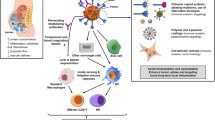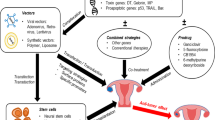Abstract
Ovarian cancer remains the leading cause of death due to gynecologic cancer in women in the United States. Gene and viral-based therapies represent novel therapeutic approaches for cancer. The manipulation of genetic content of tumor cells toward a therapeutic end has been divided into several general strategies, including molecular chemotherapy, mutation compensation, immunopotentiation, and virotherapy. Improvements in delivery vehicles and in evaluation of gene transfer and viral replication remain important areas of investigation. We highlight the most recent advances in these novel therapeutic approaches for ovarian cancer and include a summary of recent clinical trials.
Similar content being viewed by others
Explore related subjects
Discover the latest articles and news from researchers in related subjects, suggested using machine learning.References and Recommended Reading
Ozols RF, Schwartz PE, Eifel PJ: Ovarian cancer, fallopian tube carcinoma and peritoneal carcinoma. In Cancer, Principles and Practice of Oncology, edn 6. Edited by Devita VT, Hellman S, Rosenburg SA. Philadelphia: Lippincott Williams & Wilkins; 2001:1597–1632.
SEER: Surveillance, Epidemiology, and End Results Program. (Database) 2003. http://seer.cancer.gov/. Accessed 4/22/06.
Mills GB, Fang X, Lu Y, et al.: Specific Keynote: Molecular therapeutics in ovarian cancer. Gyn Oncol 2003, 88:S88-S92.
Kirby TO, Curiel DT, Alavarez RD: Gene therapy for ovarian cancer: progress and potential. Hematol Oncol Clin N Am 2003, 17:1021–1050.
Rocconi RP, Numnum TM, Stoff-Khalili M, et al.: Targeted gene therapy for ovarian cancer. Cur Gene Ther 2005, 5:643–653.
Benencia F, Courreges MC, Conejo-Garcia JR, et al.: HSV oncolytic therapy upregulates interferon-inducible chemokines and recruits immune effector cells in ovarian cancer. Mol Ther 2005, 12:789–802.
Peng KW, Hadac EM, Anderson BD, et al.: Pharmacokinetics of oncolytic measles virotherapy: eventual equilibrium between virus and tumor in an ovarian cancer xenograft model. Cancer Gene Ther 2006, 13:732–738.
Hurtado A, Tseng J, Meruelo D: Gene therapy that safely targets and kills tumor cells throughout the Body. Rejuvenation Res 2006, 9:36–44.
Indraccolo S, Tisato V, Tosello V, et al.: Interferon-alpha gene therapy by lentiviral vectors contrasts ovarian cancer growth through angiogenesis inhibition. Hum Gene Ther 2005, 16:957–970.
Glascow JN, Bauerschmitz GJ, Curiel DT, Hemminki A: Transductional and transcriptional targeting of adenovirus for clinical applications. Cur Gene Ther 2004, 4:1–14.
Rein DT, Breidenbach M, Kirby TO, et al.: A fiber-modified, secretory leukoprotease inhibitor promoter-based conditionally replicating adenovirus for the treatment of ovarian cancer. Clin Cancer Res 2005, 11:1327–1335. A classic example of multimodality targeting to increase vector sensitivity and specificity. Both adenoviral fiber modification and a tumor-specific promoter are eloquently incorporated in an advanced CRAd.
Zhu ZB, Makhija SK, Lu B, et al.: Transcriptional targeting of adenoviral vector through the CXCR4 tumor-specific promoter. Gene Ther 2004, 11:645–648.
Zhu ZB, Makhija SK, Lu B, et al.: Incorporating the survivin promoter in an infectivity enhanced CRAd-analysis of oncolysis and antitumor effects in vitro and in vivo. Int J Oncol 2005, 27:237–246.
Krasnykh VN, Mikheeva GV, Douglas JT, Curiel DT: Generation of recombinant adenovirus vectors with modified fibers for altering viral tropism. J Virol 1996, 70:6839–6846.
Wu H, Han T, Lam JT, et al.: Preclinical evaluation of a class of infectivity-enhanced adenoviral vectors in ovarian cancer gene therapy. Gene Ther 2004, 11:874–878.
Stoff-Khalili MA, Rivera AA, Glascow JN, et al.: A human adenoviral vector with a chimeric fiber from a canine adenovirus type 1 results in novel expanded tropism for cancer therapy. Gene Ther 2005, 12:1696–1706.
Subramanian IV, Nguyen TMB, Truskinovsky AM, et al.: Adeno-associated virus-mediated delivery of a mutant endostatin in combination with carboplatin treatment inhibits orthotopic growth of ovarian cancer and improves long-term survival. Cancer Res 2006, 66 4319–4328.
Stoff-Khalili MA, Dall P, Curiel DT.: From gene therapy to virotherapy for ovarian cancer. Minerva Gynecol 2004, 56:503–514. A detailed overview of virotherapy. Contains pertinent tables outlining common viral vectors and significant ovarian cancer tumor-specific promoters.
Sato T, Serikawa T, Sekine M, et al.: Increased efficiency of cisplatin-resistant cell lines to DNA-mediated gene transfer with cationic liposome. J Obstet Gynaecol Res 2005, 31:368–374.
Louis MH, Dutoit S, Denoux Y, et al.: Intraperitoneal linear polyethylenimine (L-PEI)-mediated gene delivery to ovarian carcinoma nodes in mice. Cancer Gene Ther 2006, 13:367–374.
Urban-Klein B, Werth S, Abuharbeid S, et al.: RNAimediated gene-targeting through systemic application of polyethylenimine (PEI)-complexed siRNA in vivo. Gene Ther 2005, 12:461–466.
Jiang W, Xu CJ, Shao ZM, et al.: Enhanced efficiency and specificity of ovarian cancer gene therapy in rats with a novel nonviral gene delivery system (GE7) via intraovarian artery perfusion approach. Cancer Gene Ther 2005, 12:810–817.
Desaknai S, Lumniczky K, Esik O, et al.: Local tumor irradiation enhances the anti-tumour effect of a double-suicide gene therapy system in a murine glioma model. Anticancer Res 2003, 5:377–385.
Song Y, Kong B, Ma D, et al.: Procaspase-3 enhances the in vitro effect of cytosine deaminase-thymidine kinase disuicide gene therapy on human ovarian cancer. Int J Gynecol Cancer 2006, 16:156–164.
Kang Y, Xu CJ, Wu CQ, et al.: A novel strategy to compensate the disadvantages of live vaccine using suicide-gene system and provide better antitumor immunity. Vaccine 2006, 15:2141–2150.
Mahasreshti PJ, Kataram M, Wu H, et al.: Ovarian cancer targeted adenoviral-mediated mda-7/IL-24 gene therapy. Gynecol Oncol 2006, 100:521–532.
Ma X, Wang S, Zhou J, et al.: Induction of apoptosis in human ovarian epithelial cancer cells by antisurvivin oligonucleotides. Oncol Rep 2005, 14:275–279.
Bartholomeusz C, Itamochi H, Yuan LX, et al.: Bcl-2 antisense oligonucleotide overcomes resistance to E1A gene therapy in a low HER2-expressing ovarian cancer xenograft model. Cancer Res 2005, 65:8406–8413.
Deng KX, Zhong L, Jiang MX, et al.: Effect of RNAi-mediated survivin gene silencing on apoptosis of ovarian cancer cell lines SKOV3 and SKOV3/ADM. Ai Zheng 2005, 24:945–950.
Landen CN Jr, Chavez-Reyes A, Bucana C, et al.: Therapeutic EphA2 gene targeting in vivo using neutral liposomal small interfering RNA delivery. Cancer Res 2005, 65:6910–6918.
Curiel TJ, Wei S, Dong H, et al.: Blockade of B7-H1 improves myeloid dendritic cell mediated antitumor immunity. Nat Med 2003, 9:562–567.
Curiel TJ, Cheng P, Mottram P, et al.: Dendritic cell subsets differentially regulate angiogenesis in human ovarian cancer. Cancer Res 2004, 64:5535–5538.
Bauerschmitz GJ, Lam JT, Kanerva A, et al.: A Treatment of ovarian cancer with a tropism modified oncolytic adenovirus. Cancer Res 2002, 62:1266–1270.
Bauerschmitz GJ, Guse K, Kanerva A, et al.: Triple-targeted oncolytic adenoviruses featuring the Cox2 promoter, E1A transcomplementation, and serotype chimerism for enhanced selectivity for ovarian cancer cells. Mol Ther 2006, 14:164–174.
Galanis E, Hartman LC, Cliby W, et al.: Phase I trial of intraperitoneal (IP) administration of a measles virus (MV) derivative expressing the human carcinoembryonic antigen (CEA) in ovarian cancer patients [abstract]. J Clin Oncol Proc ASCO 2006, 24:5028.
Kanerva A, Zinn KR, Chaudhuri TR, et al.: Enhanced therapeutic efficacy for ovarian cancer with a serotype 3 receptor-targeted oncolytic adenovirus. Mol Ther 2003, 8:449–458.
Kanerva A, Zinn, KR, Peng KW, et al.: Noninvasive dual modality in vivo monitoring of the persistence and potency of tumor targeted conditionally replicating adenovirus. Gene Ther 2005, 12:87–94.
Li JZ, Holman D, Li H, et al.: Long term tracing of adenoviral expression in rat and rabbit using luciferase imaging. J Gene Med 2005, 7:792–802.
Alvarez RD, Gomez-Navarro J, Wang M, et al.: Adenoviralmediated suicide gene therapy for ovarian cancer. Mol Ther 2000, 2:524–530.
Hasenburg A, Tong XW, Fischer DC, et al.: Adenovirusmediated thymidine kinase gene therapy in combination with topotecan for patients with recurrent ovarian cancer: 2.5-year follow-up. Gynecol Oncol 2001, 83:549–554.
Hasenburg A, Tong XW, Rojas-Martinez A, et al.: Thymidine kinase gene therapy with concomitant topotecan chemotherapy for recurrent ovarian cancer. Cancer Gene Ther 2000, 7:839–844.
Tait DL, Obermiller PS, Hatmaker AR, et al.: Ovarian cancer BRCA1 gene therapy: Phase I and II trial differences in immune response and vector stability. Clin Cancer Res 1999, 5:1708–1714.
Alvarez RD, Barnes MN, Gomez-Navarro J, et al.: A cancer gene therapy approach utilizing an anti-erbB-2 single-chain antibody-encoding adenovirus (AD21): a phase I trial. Clin Cancer Res 2000, 6:3081–3087.
Madhusudan S, Tamir A, Bates N, et al.: A multicenter Phase I gene therapy clinical trial involving intraperitoneal administration of E1A-lipid complex in patients with recurrent epithelial ovarian cancer overexpressing HER-2/neu oncogene. Clin Cancer Res 2004, 10:2986–2996.
Wolf JK, Bodurka DC, Gano JB, et al.: A phase I study of Adp53 (INGN 201; ADVEXIN) for patients with platinum- and paclitaxel-resistant epithelial ovarian cancer. Gynecol Oncol 2004, 94:442–448.
Buller RE, Runnebaum IB, Karlan BY, et al.: A phase I/II trial of rAd/p53 (SCH 58500) gene replacement in recurrent ovarian cancer. Cancer Gene Ther 2002, 9:553–566.
Buller RE, Shahin MS, Horowitz JA, et al.: Long term follow-up of patients with recurrent ovarian cancer after Ad p53 gene replacement with SCH 58500. Cancer Gene Ther 2002, 9:567–572.
Vasey PA, Shulman LN, Campos S, et al.: Phase I trial of intraperitoneal injection of the E1B-55-kd-gene-deleted adenovirus ONYX-015 (dl1520) given on days 1 through 5 every 3 weeks in patients with recurrent/refractory epithelial ovarian cancer. J Clin Oncol 2002, 20:1562–1569.
Author information
Authors and Affiliations
Corresponding author
Rights and permissions
About this article
Cite this article
Kimball, K.J., Numnum, T.M., Rocconi, R.P. et al. Gene therapy for ovarian cancer. Curr Oncol Rep 8, 441–447 (2006). https://doi.org/10.1007/s11912-006-0073-x
Issue Date:
DOI: https://doi.org/10.1007/s11912-006-0073-x




